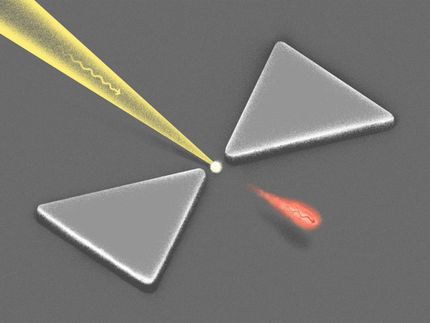Chemical Bonding of Phase-Change Materials
Rational syntheses of such new materials are much easier
Advertisement
In principle, the nature of chemical bonding has been known for almost 100 years, and is based on quantum or wave mechanics. When atoms combine to form larger groups (molecules), they interact with each other via so-called electronic “wave functions”. In the case of the water molecule, H2O, the wave functions of an oxygen atom (O) and of two hydrogen atoms (H) interfere.
We know from everyday experience that interfering waves can either amplify or cancel each other, and atomic wave functions also interfere in a very similar way, i.e., there is either amplification (bonding of atoms) or cancellation (repulsion of atoms). In the publication “Chemical bonding in phase-change chalcogenides”, Dr. Peter Müller and Professor Richard Dronskowski, Institute of Inorganic Chemistry at RWTH Aachen University, together with colleagues from Oxford University and FZ Jülich, describe the chemical bonding in complicated “phase-change” materials, which typically contain germanium, antimony and tellurium.
The scientists discovered that the chemical bonding of the aforementioned technologically relevant (electronic/optical memory) materials is not new, but has been known for decades from analogous molecular compounds. All chemical compounds of this type have a pronounced surplus of electrons and need to redistribute the excess electrons over more than two atoms. Hence, the electronic wave functions of at least three (not two) atoms interfere with each other, resulting in precisely the physical properties that are of technological interest. In particular, the scientists were able to represent graphically the spatial shape of the relevant electronic wave functions for the first time, on the basis of quantum-mechanical calculations. The quantum-chemical nature of these bonds has thus been clarified and rational syntheses of such new materials are much easier. The work of the Aachen chemists and colleagues has been published in the journal “Journal of Physics: Condensed Matter”.
Original publication
Other news from the department science

Get the chemical industry in your inbox
By submitting this form you agree that LUMITOS AG will send you the newsletter(s) selected above by email. Your data will not be passed on to third parties. Your data will be stored and processed in accordance with our data protection regulations. LUMITOS may contact you by email for the purpose of advertising or market and opinion surveys. You can revoke your consent at any time without giving reasons to LUMITOS AG, Ernst-Augustin-Str. 2, 12489 Berlin, Germany or by e-mail at revoke@lumitos.com with effect for the future. In addition, each email contains a link to unsubscribe from the corresponding newsletter.
































































